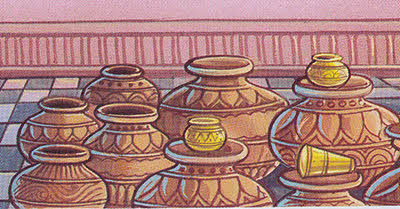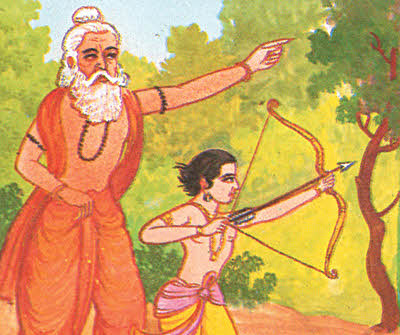
Twenty lacs of Purvas after his birth, the Lord became king in this city to guard the subjects. The first king of kings, like the omkara of mantras, he guarded his subjects like his own children. The Lord appointed ministers, like the minor members of his own body, able in the punishment of the wicked and protection of the good. The King, Vrsabha-marked, established able police for guarding against theft, etc., like Sutraman Lokapalas. For the government he, the elephant of kings, collected elephants, the superior branch of the army like the best member of the body. He, Vrsabha-bannered, maintained fine horses holding their necks very high, as if in rivalry with the horses of the sun. The son of Nabhi himself built chariots made of close-fitted wood like aerial cars on earth. Then the son of Nabhi made a collection of foot-soldiers of well-tried courage, just as in a cakravartin incarnation. The son of Nabhi established in it army-commanders like very strong pillars of the palace of new sovereignty. The Lord of the World collected oxen, camels, buffaloes, mules, skilled in their use.
The wishing-trees having become extinct, like families without children, at that time the people ate bulbs, roots, fruits, etc. They ate herbs also, rice, wheat, chickpeas, beans, etc., grown up of their own accord like grass, uncooked. Being told by them, “This food* does not digest,” the Lord said, “Crush and skin them with your hands, then eat.” They obey the advice of the Lord of the World, but the food does not digest from the hardness of the herbs. Again told by them, the Master said, “Crush with your hands, wet with water, put in a leaf-cup and eat,” They did just so. In that case to the Lord of the World, told again by them about the pain from undigested food, instructed them again: “Follow the former procedure, put the herbs in your hands and put them in the heat under the arms, then eat them with pleasure” While the people were weak from food undigested in that case also, a fire started from the rubbing together of branches in a group of trees. It burned grass, wood, etc.

From the mistaken idea that it was a shining jewel, the people ran and began to take it with outstretched hands. Burned by the fire, terrified, they went to the Lord and said, “Some wonderful new thing has happened.” The Master said, “The fire started from the fault of the period of time that is both good and bad. It does not exist in the period that is entirely bad nor in the one that is entirely good. Standing at the side of the fire, take way all adjacent grass, etc., and then take it afterwards. Then having prepared the food according to the method told you before, throw the herbs in the flame, cook, and eat.” They did so, ignorant; and the herbs were burned by the fire. They went to the Master again and said, “O Master, this greedy (fire) gives us nothing. Like a glutton he alone devours completely the herbs thrown in.” At that time the Lord was seated on an elephant’s shoulder, and had them bring a lump of wet clay. Placing the clay on the protuberance on the elephant’s forehead (kumbha) and spreading it with his hand, the Lord made a vessel having its (the Kumbha’s) shape the first of the arts. The Master said, “Maize other dishes in this way; put in the fire, cook the herbs, and then eat.” Then they executed the Master’s command just so.
From that time, the first artisans, the potters, arose. For the sake of houses for the people, the Lord appointed carpenters. Verily, the procreation of great men is for the procreation of happiness for everyone. He, wise, appointed painters for the painting of the houses, for the sake of diversity of the people’s pleasure. He established weavers for the people’s clothes; for in the place of all the wishing-trees, the Lord alone was a wishing-tree. The Master, sole father of the world, appointed barbers for the people who were much annoyed by the growth of hair and nails. These five arts, each divided into twenty parts, one hundred-fold, spread among the people like the waters of rivers. He established grass-gathering, wood-carrying, ploughing and trade these businesses for the sake of the people’s livelihood. The Master established the fourfold means: conciliation, bribes, dissension, and force the junction of the four roads in the city of law of the world. He taught Bharata all the seventy-two arts, as if in accordance with the custom, “Teach spiritual knowledge to the eldest son.” Bharata taught fully the other sons, his brothers. For knowledge is one hundred-branched in the case of a proper recipient. The son of Nabhi told Bahubali the characteristics with many subdivisions of elephants, horses, women, and men. He taught the eighteen alphabets to Brahmi with his right hand, and with his left hand arithmetic to Sundari.

Then the Lord established measures of bulk, weight, linear measure, and jewellers’ weight in objects; boats; and gems, etc., threaded. At that time was instituted court-procedure plaintiff and defendant with king, magistrate, court-house and witnesses. Worship of elephants, etc., archery, medicine, attendance on kings, etc., battle, science of politics, binding, beating, killing, and organizations arose then. Extreme selfishness of the people, saying “That is my father, mother, brother, wife, son, house, money,” and things like that, commenced at that time. Because they had seen the Master decorated and ornamented at the wedding, after that the people decorated and ornamented themselves. Because they had seen the Lord take the hand (of the bride) for the first time, the people do it even today. For the path made by the great is permanent. From the time of the lord’s marriage, there was marriage with girls who were given. Then also began tonsure and initiation, battle-cries, and enquiries. All this, even though censurable, the Master, knowing his duty, instituted from compassion for the people. From oral tradition about them, the arts, etc., even today exist on earth, put in the form of treatises by learned men of recent times. By the teaching of the Master all the people became skilled. Without a teacher even men act like cattle.
Then, the stage-director of the play of the order of the world, he made the people into four divisions: Ugras, Bhogas, Rajanyas, and Ksatras. The Ugras were the guardsmen, appointed to give cruel punishments; the Bhogas were the ministers, etc., of the Lord, like the Trayastrinsas of Haris. The Rajanyas were the companions of the Lord, and all the other people were Ksatriyas by name. After arranging thus a new order of customs and law, the Lord enjoyed a new Sri of sovereignty like a new bride. The son of Nabhi prescribed a punishment according to the crime for those deserving punishment, just as a doctor prescribes a medicine for the sick according to the disease. Terrified of punishment then the people did not commit theft, etc., at all. Verily the law of punishment alone is a snakecharmer for the serpent of all crime. No one crossed the boundary of anyone else’s fields, gardens, houses, etc., as the people, well taught, did not transgress the Lord’s command. At the proper time the cloud rained for the maturity of the grain, as if praising the Lord of the World’s law under pretext of thundering. The countries, filled with fields of grain, plantations of cane, herds of cattle, indicated by their wealth the Master’s lack of greed. The Lord made Bharatazone like Videha-zone in general by the people being made to know discernment about what was to be accepted and what rejected. From the time of his coronation as king, the son of Nabhi passed sixtythree lacs of Purvas* directing the earth.











No comments yet.
Leave a comment